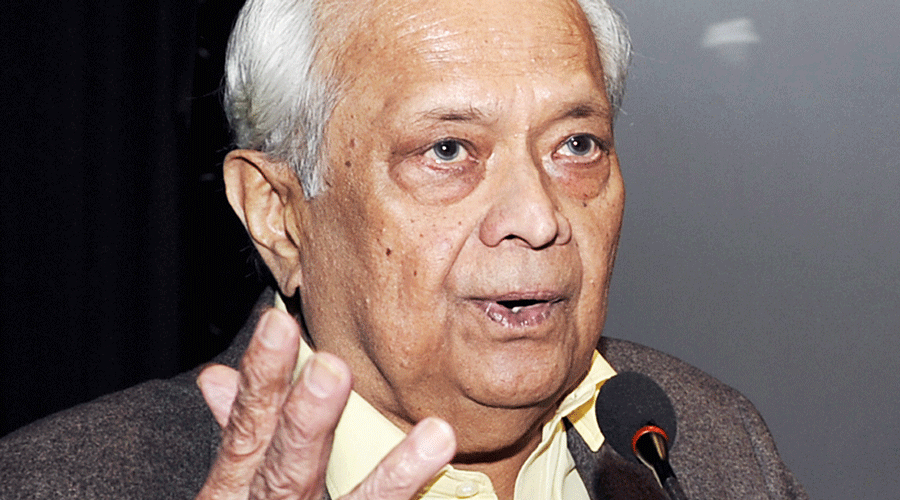The Centre of Excellence for Indian Knowledge Systems (CEIKS) at IIT Kharagpur has published yet another calendar that denigrates western knowledge and worldviews as “reductionist”, “derivative”, “mechanistic” and “destructive”, claiming that anything worthwhile that we find in western thought and science is borrowed from the much superior ancient Indian (Hindu) knowledge system. Physicist Bikash Sinha dissects this contention in this interview with Subhoranjan Dasgupta, professor of human science.
Q: While belittling the entire history of western knowledge from the Renaissance to the Industrial Revolution, and claiming that “in the last two centuries our clinging to the worldview of (Isaac) Newton and (Rene) Descartes has perilously brought us close to destruction”, the calendar praises Indian knowledge systems as the sole source of knowledge….
Sinha: This assessment is most unfortunate and disturbing. We all know the meaning of “reductionist”, “derivative”, “mechanistic” and “destructive”…. I would like to counter this thesis by positing some opposing adjectives. Western thought, as it flowered from the Renaissance to the Enlightenment and Industrial Revolution, and the genesis as well as the advance of modern science from Isaac Newton onwards, is “deep”, “profound”, “intensive”, “extensive”, “variegated”, “multifaceted” and “creative”.
Be it the Cartesian logic of Rene Descartes, be it the engaging humanism of Immanuel Kant, be it the dialectical triad of Hegel, be it the economic philosophy of Karl Marx and Friedrich Engels, be it the subtlest psychological explorations of Sigmund Freud – all these intellectual-creative processes have widened our frontiers of knowledge and realisation immeasurably. These have made us what we are today. These have not “reduced” us in any way and these have not been “derived”. Above all, they are not “mechanistic”.
Q: This wholesale disparagement of the western ethos has left out, perhaps deliberately or out of ignorance, the deep and reflective spiritual tradition of the West….
Sinha: While going through this controversial calendar, I too was struck by this perplexing absence. Almost everyone — Francis Bacon, Charles Darwin, Rene Descartes — have been presented as “mechanistic” culprits but no mention has been made of the other side, of the deep mystical side of the West. I don’t want to posit this tradition as a counterfoil to our own spiritual tradition, for which I cherish the utmost reverence, but as a parallel stream which nurtures our innermost selves.
Let me mention a few names and their unforgettable contributions. I especially have in mind the great mystic Christian tradition. I recall the profoundest poems of St Francis of Assisi, the Confessions of St Augustine, The Imitation of Christ written by Thomas á Kempis, the stirring metaphysical poetry of John Donne. I sometimes wonder why this soul-searching tradition has been ignored. Perhaps because the names of St Augustine and St Francis of Assisi would have involved the recognition of another enriching perspective, not at all “mechanistic” or “utilitarian”.
Q: How would you react to the statement of Prof. Joy Sen, chairman of the CEIKS, that whatever western efflorescence took place in philosophy and science was “derived” from ancient Indian thought? And that this system of ancient Indian thought was given a new casing and expression by western thinkers and scientists and sent back, second-hand, to India?
Sinha: This attitude underlines a feeling of blind and unquestioned superiority…. I shall give you four examples from western philosophy and science that refute Prof. Joy Sen and which prove that the variegated western flowering was in no way derived. By making this claim I am in no way disputing the grandeur and excellence of Indian intellectual achievement.
When Descartes pronounced his unforgettable maxim, “Cogito ergo sum” — “I think, therefore I am” — he did not borrow this revolutionary idea from Indian philosophy.
When Marx and Engels propounded their theory of class-based society and class war in order to obliterate social divisions, they did not derive it from Indian social or political thought. When Newton discovered the law of gravity, ancient Indian science did not whisper the truth into his ears. When Freud constructed his remarkable triad — Id, Ego and Superego — he did not have to depend in any way on eastern wisdom.
As I have said, these powerful examples do not negate the depth and extent of sanatani achievement, they merely plead for confluence, for coexistence, for mutual enrichment and not derivative imperialism.
I shall give you one appropriate example. The greatest exponent of modern Indian thought in our days, the late Prof. Bimal Krishna Matilal, who was the Spalding Professor of Indian Philosophy and Religion at Oxford University, wrote a remarkable book titled Perceptions. He, in his book, drew erudite parallels between eastern and western philosophy. He initiated a fruitful dialogue between the two streams.
You know, Prof. Matilaltold me: “I have one wish — if I ever had the opportunity, I would have loved to have a dialogue with Immanuel Kant.”
He wouldn’t have expressed this deepest desire had Kant been essentially “derivative” and second-hand.










